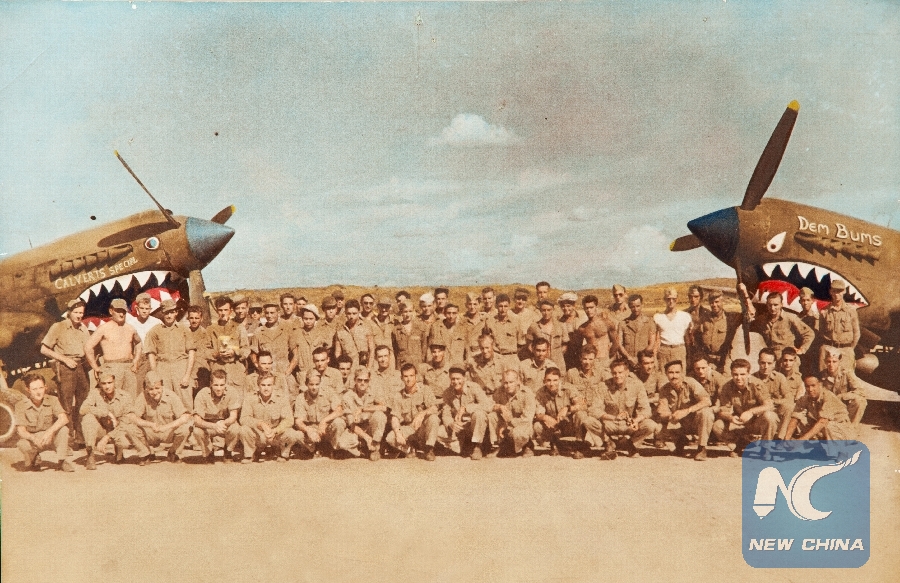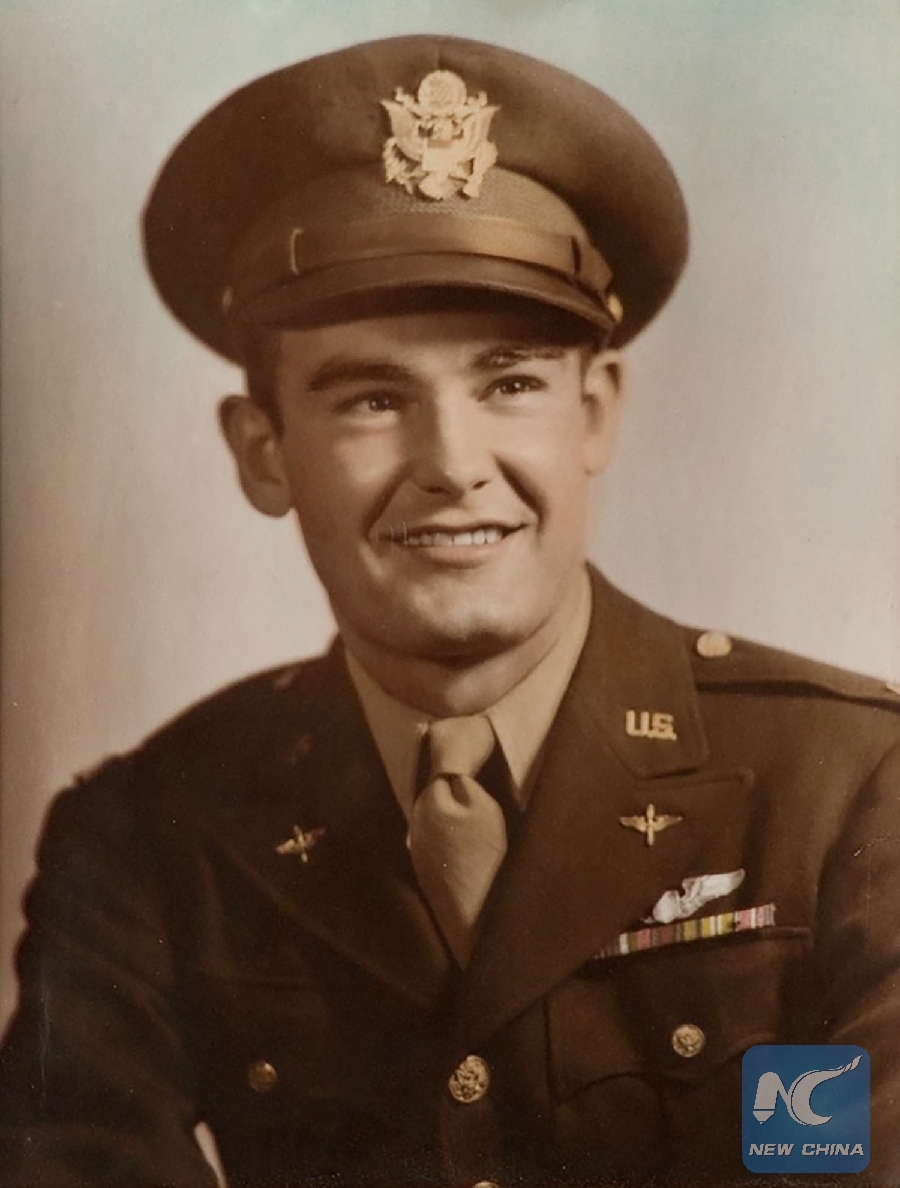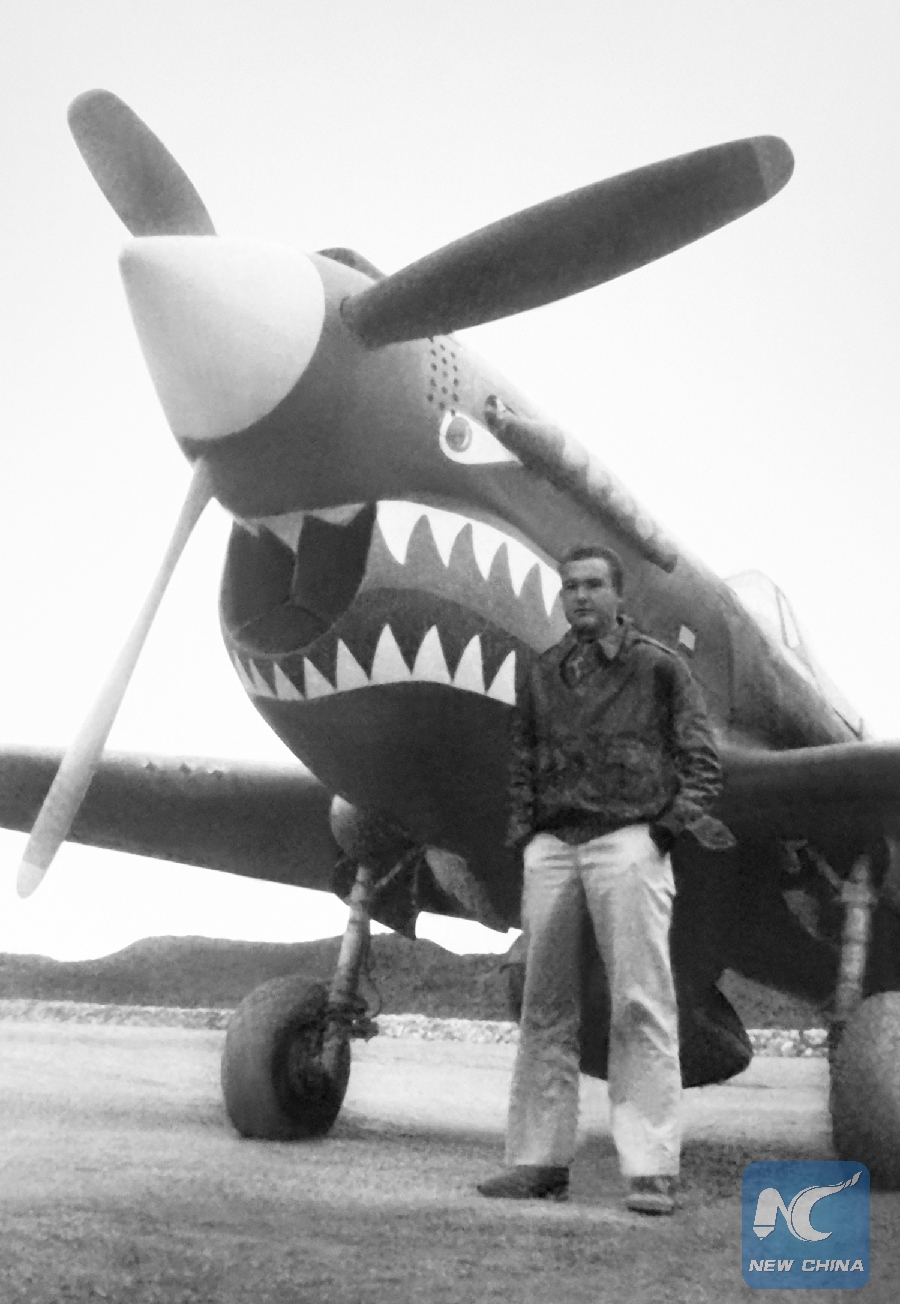
Members of the 76th Squadron of the 23rd Fighter Group of the 14th U.S. Air Force, in which Flying Tiger pilot Glen Beneda served as a pilot, pose for photos in front of two shark-teeth fighter planes in China during the World War II. (Xinhua)
by Xinhua writers Han Fang, Wu Xiaojun and Pan Lijun
NEW YORK, May 21 (Xinhua) -- U.S. Flying Tigers veteran Glen Beneda could hardly hold back his tears when he saw the wreckage of his fighter plane shot down by the Japanese during the World War II still lying in the mud in a lake in central China.
In his tour to Jianli, a county in Hubei Province in 2005, then 81-year-old Beneda was greeted by more than 7,000 local residents, and was carried by young farmers in a bamboo chair to the lake just like what the local villagers did about 60 years ago to rescue him after he ejected himself from his P-51 fighter plane, badly wounded.
This is one of the heartwarming scenes in the documentary "Touching the Tigers," shown by Glen's son Edward Beneda at a gathering of eight Flying Tigers veterans, as well as more than 30 family members in Las Vegas in mid May. Many of them were moved to tears.
The sacrifices Chinese and Americans made side by side in the war are our common heritage which should be cherished by our two countries, said Edward, vice chairman of the Sino-American Aviation Heritage Foundation (SAAHF).
"We disagree from time to time, but the important thing is remembering the history, remembering the investment that we have in the lives of the Chinese and the Americans," said Edward.
"Peace is what we want," Edward stressed. "Let's continue to trust one another, let's continue to go forward. And hopefully this world will be a better future for our children, our grandchildren, and great grandchildren."
The Flying Tigers, a U.S. air squadron composed of airmen from the United States Army Air Corps, Navy, and Marine Corps, helped the Chinese fight Japanese invaders in WWII.
About 18,000 American Air Force came to China and joined the War Against Japanese Aggression, and 2,193 Flying Tigers among them lost their lives. The Chinese people saved the lives of nearly 900 American Flying Tigers pilots and other airmen, at the cost of tens of thousands of Chinese who sacrificed their lives in the rescue efforts.
"CHINESE PEOPLE ARE HEROES"
To fulfill his father's wish and educate younger generations, Edward committed himself to documenting and publicizing the U.S.-China relationship in the war that brought the two countries close together as friends and allies.
The documentary tells the story about his father Glen Beneda, who was assigned to China as a fighter pilot in the U.S. 14th Air Force in 1943 at the age of 19.
During his career in China, Glen flew 79 missions in a P-40 fighter plane before changing to a P-51. In May 1944, when he was on his 81st mission, an attack on a large Japanese army base in central China's Hankou, his P-51 was shot down by the Japanese.

U.S. Flying Tigers pilot Glen Beneda is pictured in the U.S. Air Force uniform during the World War II. (Xinhua)
After parachuting in Jianli, Glen was surrounded by curious farmers working in the rice paddies. He tried to talk to them with the help of an English-Chinese phrase book for emergency use. The farmers finally realized the man in front of them was an American soldier.
They took good care of him and managed to find medical assistance for his badly wounded legs. To hide him from the Japanese troops, they tied heavy stones to his plane and sank it to the bottom of the lake.
On a stretcher, Glen was transferred by anti-Japanese guerrillas from one village to another. To avoid the Japanese troops, they hid by day and marched at night, and finally arrived at the Fifth Division of China's New Fourth Army led by Li Xiannian, who later became Chinese president from 1983 to 1988.

U.S. Flying Tigers pilot Glen Beneda is seen in front of a P-40 figther plane in China during the World War II. (Xinhua)
"General Li was very generous to us. He gave us each a Japanese officer's pistol, and he gave me a beautiful sword," Glen recalled in a previous interview.
After a hard journey of nearly 60 days, he finally returned safely to the headquarters of the 14th Air Force in Chongqing in southwest China.
"I know that the Chinese people called the Flying Tigers hero. But my father always said that the Chinese people are the heroes, because they saved his life," Edward recalled.
PASSING FRIENDSHIP ON
"Without the Chinese people's help, I could not have had my family," Glen always said. He wished that the Beneda family would always be friends with the Chinese people from generation to generation.
Glen went back to China in 2002, and then again in 2005, that was when they got to know Li Xiaolin, daughter of Li Xiannian and then vice president of Chinese People's Association for Friendship with Foreign Countries (CPAFFC). She arranged his trip to the very village where he was saved.
In 2010, even though he was in a wheelchair and living with a pacemaker after several heart bypass operations, Glen still decided to go back to China to fulfill his last wish of expressing gratitude to the Chinese people, regardless of his doctor's warning.
This time, he took 10 family members of three generations to the small village to which he said he owed his life.
He visited the Li Xiannian Memorial Park, the former residence of Li Xiannian, in Hong'an County of Hubei, and presented the pistol given by General Li as a souvenir to the museum as a permanent collection.
In an interview during the trip, Brian Beneda, Glen's grandson, said the spirit of his grandfather also exists in his later generations. "The trip is very meaningful to know about China, about WWII and U.S.-China involvement ... and to continue the friendship that was built so many years ago."
Shortly after his last journey to China, Glen passed away from a heart attack in October. According to his wish, some of his cremains were sent to China by his wife Elinor Beneda and two sons, and laid to rest in the Li Xiannian Memorial Park.
"We consider the Chinese people as part of our family. I'm not talking about just the ones that saved my father's life, but we have a very profound and strong relationship with all the Chinese people," Edward said emotionally.
KEEPING STORY ALIVE
Edward said his father regarded the China experience a valuable lesson, namely to be good to others and to serve. Indeed, Glen worked his whole life as a serviceman.
After the war, Glen came back to his hometown in McCook, a small town in Nebraska, and continued his family business planting wheat and corn. In 1951, he moved to California and landed a job in a post office. Later, he was hired by the Los Angeles County Fire Department and worked as a firefighter for 25 years until retirement.

Li Xiaolin, daughter of Li Xiannian and then vice president of Chinese People's Association for Friendship with Foreign Countries, Glen Beneda's wife Elinor Beneda, son Edward Beneda and Henry Beneda (from L to R) mourn during the cremains laying ceremony of Glen Beneda, a U.S. Flying Tigers pilot during the World War II, in Hong'an County, central China's Hubei Province, on May 11, 2011. (Xinhua)
"My father, along with many of the WWII veterans, they were very humble people. They went and did their job that they were supposed to do," Edward said his father didn't talk much about his experience in China until the last decade of his life.
Although seldom mentioning this experience, Glen got together with the other Flying Tigers members every couple of years. In his thirties, Edward began to join his father and got to know some of the veterans.
"We didn't know the story, then we found out that they are heroes and they did many heroic things." He began to keep an eye on their stories and accompanied his father to China several times.
In his father's last years, Edward developed a strong sense of mission to keep the story alive. With the help of Li Xiaolin, a documentary about Glen was made.
After the documentary's premier in 2011, Edward often showed it at local schools in Los Angeles where he lives, and talked to the youth about what happened in WWII.
He said that for the young generation, reading the history in the book is one thing, but actually listening to somebody tell the real story is much better. "My family is involved in this part of the history, and it really brings it to life ... my wife and I most probably will not be here in the next 20 or 30 years, but we want the stories to live on."
"It's very important for our two countries to keep this strong relationship in the history ... we have the responsibility to keep the record true, so that future generations can know about it and continue to build upon this great Chinese-American cultural heritage," he said.

